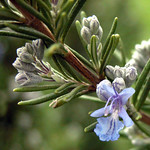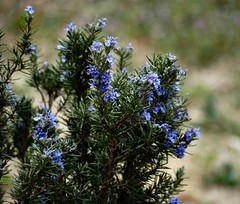Rosemary
Rosemary
This aromatic herb originally from the Mediterranean region was most likely introduced into cultivation in Britain by the Romans. The plant is surrounded by ritual, mythology, symbolism and practical use. The English popular name for it is 'the herb of memory' - an interesting reflection of the role of archives as well as the philosophy behind the design of the plantings, which are in ribbons resembling the architectural form of the human brain.
Like other trees and shrubs rosemary is seen in many cultures as a plant of life. Throughout Europe it is a symbol of love and fertility and as such an important ingredient in the preparation of baptismal meals. Being full of volatile oils it is an important culinary herb and medicine. The scented foliage and decorative flowers were often woven into bridal wreaths and bouquets in many countries.
Sir Thomas Moore (1478-1535) wrote of its meaning and links with death and in Shakespeare's Hamlet, Ophelia states "There's Rosemary; that's for remembrance".
It was often carried in funeral processions, right up until Victorian times.
Interestingly in some parts of the country there is a belief that where rosemary flourishes the woman is the boss: 'The mistress is the master, where Rosemary grows the woman rules the house'. This is maybe a reflection as to why it is not found in some private gardens!

